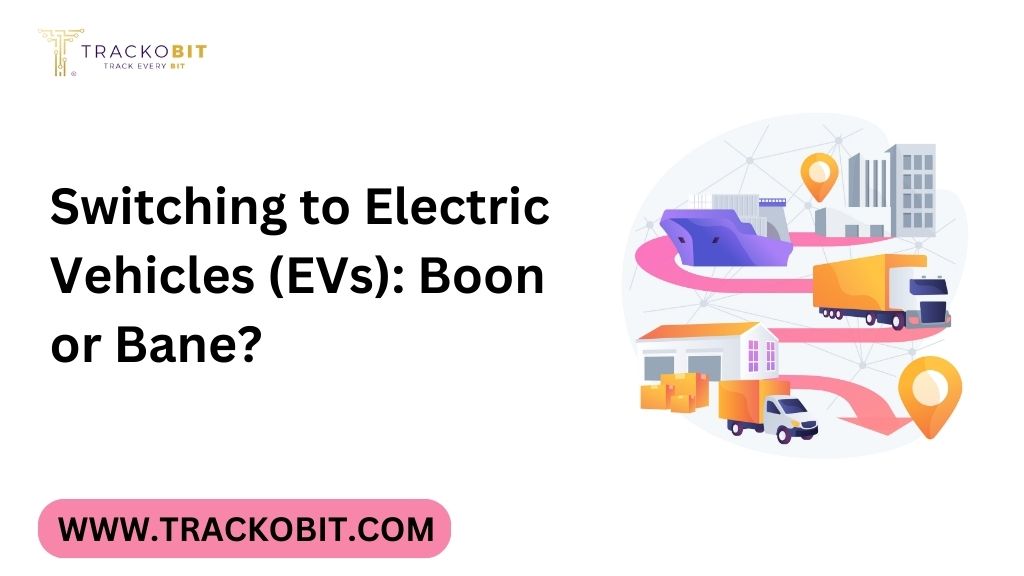Switching to Electric Vehicles (EVs): Boon or Bane?

Have you ever wondered why more and more transportation businesses are switching to electric vehicles? If not, we are here to tell you why.
In conventional vehicles, fuel eats up forty per cent of the fleet budget. This expenditure can be easily reduced through Electric Vehicles. Let’s know what they are and their pros and cons.
What are Electric Vehicles?
Electric vehicles (EVs) are vehicles that operate on multiple motors that gain their power from rechargeable lithium batteries. As opposed to conventional internal combustion engine (ICE) vehicles that rely on fossil fuels, EVs operate by using electricity as their primary source of power. Now, come to the reason why more companies are switching from conventional vehicles to electric vehicles.
It’s pretty simple!
Since EVs don’t need fossil fuels to function, they are a cheaper medium of transport as compared to conventional vehicles. Also, the lifespan of lithium batteries is between 8 to 10 years. Hence, fleet managers are sorted for a decade at least. Besides this, there are several advantages of switching from ICEs to Evs that you will get to know in the following paragraph.
Advantages of switching from ICE Vehicles to EVs
- Eco-friendly step
Since ICEs burn fuel to function, they contribute to a large number of carbon emissions daily. Using electric vehicles is a step towards eco-friendliness. Since EVs operate entirely on batteries, they don’t leave carbon footprints in the atmosphere. Hence, maintaining an ecological balance.
- Lower energy costs
Since petrol/diesel prices are constantly on a surge and are expected to rise in the future as well. Shifting towards electric vehicles seems like a smarter choice. Why? Because charging EVs will not burn a hole in your pocket.
- Tax benefits
Due to the rise of air pollutants caused by fossil fuels, the governments across the globe are diligently promoting eco-friendly practices. They are even in favour of the laws that encourage businesses to shift from ICEs vehicles to EVs. Going a little overboard, the governments of many countries offer tax concessions and subsidies to businesses that have moved towards them.
- Less maintenance
We have already learned about the concept of EVs, right? Since EVs have fewer moving parts hence, the chances of downtime reduces. Hence lower maintenance costs.
Disadvantages of switching from ICEs to Evs
As every coin has two faces. Shifting to electric vehicles comes with its own set of disadvantages. Some of these are mentioned below;
- Shorter range
This is one of the biggest disadvantages of electric vehicles. Ideally, they can cover a distance between the range of 100 to 300 miles. This range can also vary depending on the factors such as the speed of the driver.
- Limited charging facilities in remote areas
Generally, remote areas are not equipped with charging stations. This can affect the efficiency of electric trucks. Because they need to be charged from time to time to generate power. Therefore, travelling to remote areas can be difficult.
- Higher upfront costs
Even though EVs require less maintenance than ICEs vehicles, we cannot overlook the upfront cost of batteries. The higher the capacity of the batteries, the more the costs will be. Besides this, operating electric vehicles requires installing charging stations that aren’t economical.
Now, if your organisation is thinking about switching to EVs to reduce maintenance costs and increase the efficiency of your deliveries, Electric Truck Fleet Management Software is your answer.
Electric Truck Fleet Management Software
Switching to EVs may seem better than operating on ICEs. However, it comes with its own set of responsibilities for fleet managers. They have to ensure that batteries are getting used properly and are not getting wasted by the drivers. This is exactly where they need electric truck fleet management software. Let’s know about its solutions to get a better idea.
Electric Truck Fleet Management Solutions
Some of the must-have solutions of Electric Truck Fleet Management solutions are;
Battery Management System(BMS)
As the name suggests, BMS monitors important parameters of batteries such as voltage, temperature, and battery balancing. Let’s understand these parameters in detail:
- Voltage monitoring: Monitoring voltage is an important aspect of ensuring the life cycle of a battery. BMS measures the minimum and maximum voltage of the battery
- Temperature: BMS measures the average cell temperature, coolant circulation temp and overall battery temp.
- Battery Balancing: Besides monitoring the temperature and the voltage, BMS also measures the state of charge(SOC) and state of voltage(SOV) in the battery that should be balanced to ensure its proper functioning.
Driver Behaviour Monitoring
Harmful driving behaviours such as harsh braking and acceleration lead to more battery wastage. With the help of a driver behaviour monitoring system, fleet managers can identify these unhealthy driving patterns of drivers by getting real-time alerts if the drivers engage in such an activity.
Route Management And Optimization
Since electric trucks need to be charged frequently, fleet managers can assign a route to drivers that comprises sufficient charging stations. This will ensure that the vehicle is getting charged and there’s no decrease in its efficiency.
These are some solutions that can help businesses overcome the disadvantages of electric vehicles, ensure the efficiency of their fleet management operations and reduce maintenance costs. To sum up, it is a smarter choice to switch from ICEs to EVS provided that businesses navigate their way with Electric vehicle Truck Fleet Management software.
Wishing to know what else we can do for your business? Get in touch with our team today!



